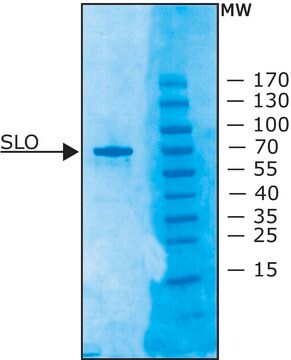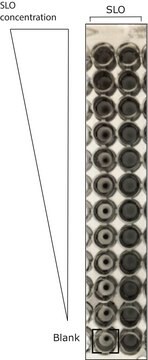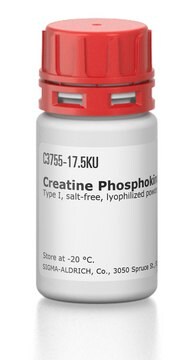S5265
Streptolysin O from Streptococcus pyogenes
lyophilized powder, Protein ~3 % by Lowry, 25,000-50,000 U/vial
About This Item
Recommended Products
form
lyophilized powder
Quality Level
specific activity
25,000-50,000 U/vial
mol wt
native 69 kDa
composition
Protein, ~3% Lowry
storage condition
(Keep container tightly closed in a dry and well-ventilated place. Keep in a dry place.)
color
white
solubility
H2O: soluble 1 mg/mL
antibiotic activity spectrum
neoplastics
Mode of action
cell membrane | interferes
storage temp.
2-8°C
Gene Information
Streptococcus pyogenes MGAS8232 ... slo(993428)
Looking for similar products? Visit Product Comparison Guide
Application
Biochem/physiol Actions
Packaging
Unit Definition
Physical form
Other Notes
Signal Word
Danger
Hazard Statements
Hazard Classifications
Acute Tox. 2 Dermal - Acute Tox. 2 Inhalation - Acute Tox. 2 Oral - Aquatic Chronic 2 - Eye Dam. 1 - Skin Irrit. 2
Storage Class Code
6.1A - Combustible acute toxic Cat. 1 and 2 / very toxic hazardous materials
WGK
WGK 3
Flash Point(F)
Not applicable
Flash Point(C)
Not applicable
Personal Protective Equipment
Regulatory Listings
Regulatory Listings are mainly provided for chemical products. Only limited information can be provided here for non-chemical products. No entry means none of the components are listed. It is the user’s obligation to ensure the safe and legal use of the product.
PDSCL
Poisonous substance
PRTR
Class I Designated Chemical Substances
ISHL Indicated Name
Substances Subject to be Indicated Names
ISHL Notified Names
Substances Subject to be Notified Names
JAN Code
S5265-VAR:
S5265-BULK:
S5265-25KU:4548173211015
S5265-25KU-PW:
Choose from one of the most recent versions:
Certificates of Analysis (COA)
Don't see the Right Version?
If you require a particular version, you can look up a specific certificate by the Lot or Batch number.
Already Own This Product?
Find documentation for the products that you have recently purchased in the Document Library.
Customers Also Viewed
Our team of scientists has experience in all areas of research including Life Science, Material Science, Chemical Synthesis, Chromatography, Analytical and many others.
Contact Technical Service














